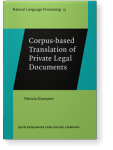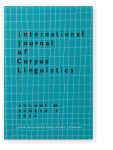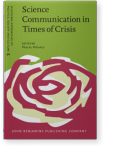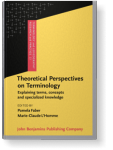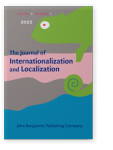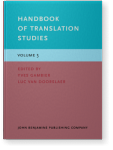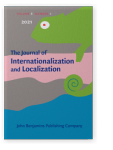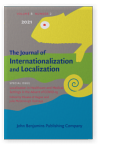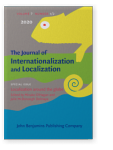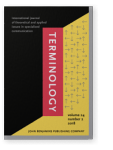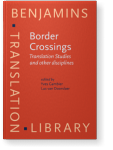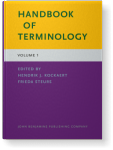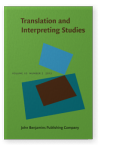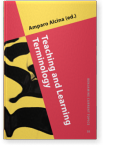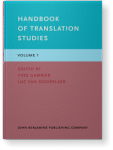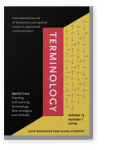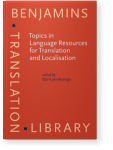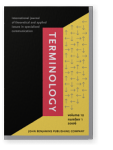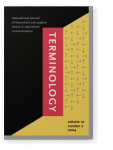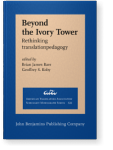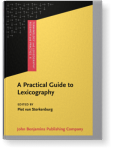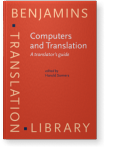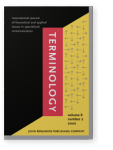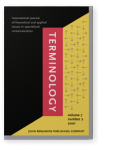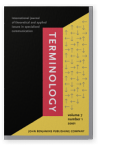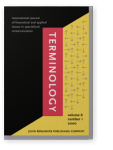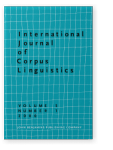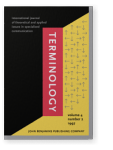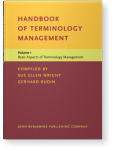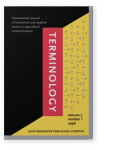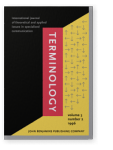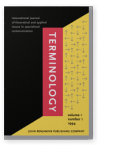Lynne Bowker
List of John Benjamins publications for which Lynne Bowker plays a role.
Book series
Journal
ISSN 1384-6655 | E-ISSN 1569-9811
2022 Chapter 4. Pivoting to support science communication in times of crisis: A case study of the Government of Canada’s Glossary on the COVID-19 pandemic Science Communication in Times of Crisis, Hohaus, Pascal (ed.), pp. 65–90 | Chapter
Much of the literature on crisis communication observes that, in the best cases, a crisis can lead to opportunity. The COVID-19 pandemic presented an opportunity for the Government of Canada’s Translation Bureau, a group that regularly creates glossaries of specialized terminology, to re-orient… read more
2022 Chapter 6. Multidimensionality Theoretical Perspectives on Terminology: Explaining terms, concepts and specialized knowledge, Faber, Pamela and Marie-Claude L'Homme (eds.), pp. 127–148 | Chapter
Multidimensionality is a phenomenon of conceptual classification that arises when concepts are classified in more than one way within a concept system according to different characteristics. Because multidimensionality can be complex and cause information overload, early terminologists focused… read more
2022 When French becomes Canadian French: The curious case of localizing COVID-19 terms with Microsoft Translator The Journal of Internationalization and Localization 9:1, pp. 1–37 | Article
In late 2020, the free online translation tool Microsoft Translator began to offer the option of translating into “French (Canada)” as a target language, alongside the previously offered “French”. Using a list of ten COVID-19 terms previously identified by Bowker (2020) as having different… read more
2021 Digital humanities and translation studies Handbook of Translation Studies: Volume 5, Gambier, Yves and Luc van Doorslaer (eds.), pp. 37–44 | Article
2021 Translating for Canada, eh? Developing Open Educational Resources to support localization into Canadian English and French Localization in Healthcare and Medical Settings in the Advent of COVID-19, O'Hagan, Minako and Julie McDonough Dolmaya (eds.), pp. 156–164 | Article
In a situation such as the COVID-19 pandemic, there is a need to distribute up-to-date public health information quickly and cost effectively in a wide range of languages and language varieties. Open Educational Resources (OER) are materials that are released under an open license and so can be… read more
2020 French-language COVID-19 terminology: International or localized? Localization around the globe, O'Hagan, Minako and Julie McDonough Dolmaya (eds.), pp. 1–27 | Article
The COVID-19 pandemic situation developed very quickly, driving an urgent and global need to communicate public health information that left relatively little time for traditional and formal language planning activities. This article investigates and compares French-language COVID-19-related… read more
2016 Information science, terminology and translation Studies: Adaptation, collaboration, integration Border Crossings: Translation Studies and other disciplines, Gambier, Yves and Luc van Doorslaer (eds.), pp. 73–96 | Article
The chapter highlights a number of interconnections within the research
agenda and applications initiatives in translation studies and information science,
looking more specifically at the development of terminology tools and
retrieval languages. We examine three areas of recent development where… read more
2015 Terminology and translation Handbook of Terminology: Volume 1, Kockaert, Hendrik J. and Frieda Steurs (eds.), pp. 304–323 | Chapter
Translators have long been term banks users; however, they are increasingly involved in developing and managing terminology resources, such as term bases that are integrated with computer-aided translation (CAT) tools. This chapter examines the role and goals of translation-oriented terminology… read more
2015 Investigating the usefulness of machine translation for newcomers at the public library Translation and Interpreting Studies 10:2, pp. 165–186 | Article
This study investigates the potential of machine translation as an efficient and cost-effective means to translate sections of the Ottawa Public Library website into Spanish to better meet the linguistic needs of the Spanish-speaking newcomer community. One-hundred and fourteen community members… read more
2010 Computer-aided translation Handbook of Translation Studies: Volume 1, Gambier, Yves and Luc van Doorslaer (eds.), pp. 60–65 | Article
2009 Better integration for better preparation: Bringing terminology and technology more fully into translator training using the CERTT approach Teaching and Learning Terminology: New strategies and methods, Alcina, Amparo (ed.), pp. 60–87 | Article
Teaching terminology is not only a goal in itself, but also an important part of teaching translation, and terminology tools are essential to teaching terminology effectively. However, electronic tools for translators and terminologists have often been relegated to a small number of courses within… read more
2008 1. A comparative evaluation of bilingual concordancers and translation memory systems Topics in Language Resources for Translation and Localisation, Yuste Rodrigo, Elia (ed.), pp. 1–22 | Article
Translators are turning to electronic language resources and tools to help cope with the increased demand for fast, high-quality translation. While translation memory tools are well known in the translation industry at large, bilingual concordancers appear to be familiar primarily within academic… read more
2006 Variation in the organization of medical terms: Exploring some motivations for term choice Terminology 12:1, pp. 79–110 | Article
The prescriptive school of thought in terminology holds that terms should be fixed items and should not be prone to variation. More recently, however, descriptive studies have begun to reveal that many terms do in fact have variants. This poses a challenge for language professionals such as… read more
2004 Ingrid Meyer, Terminologist (1957–2004) Terminology 10:2, pp. 183–188 | Article
2003 Towards a collaborative approach to corpus building in the translation classroom Beyond the Ivory Tower: Rethinking translation pedagogy, Baer, Brian James and Geoffrey S. Koby (eds.), pp. 193–210 | Article
2003 3.2 Specialized lexicography and specialized dictionaries A Practical Guide to Lexicography, Sterkenburg, Piet van (ed.), pp. 154–164 | Chapter
2003 4. Terminology tools for translators Computers and Translation: A translator's guide, Somers, Harold (ed.), pp. 49–65 | Article
2002 Third Conference on Language Resources and Evaluation (LREC 2002) Terminology 8:2, pp. 329–331 | Miscellaneous
2002 An empirical investigation of the terminology profession in Canada in the 21st century Terminology 8:2, pp. 283–308 | Article
This article contains an investigation into the terminology profession in Canada in the 21st century. Terminologists themselves have their own opinion about the state of the profession, but the aim of this study is to investigate terminology from the perspective of those who employ terminologists… read more
2001 Review of Wright & Budin (2001): Handbook of Terminology Management, Volume 2 Terminology 7:2, pp. 287–290 | Review
2001 Review of Béjoint & Thoiron (2000): Le Sens en Terminologie Terminology 7:1, pp. 123–125 | Review
2001 Research models in translation studies: Manchester, UK, 28–30 April 2000 Terminology 7:1, pp. 131–132 | Miscellaneous
2000 Reports of Meetings: 2nd International Conference on Language Resources and Evaluation Athens, Greece, 31 May - 2 June 2000 Terminology 6:1, pp. 149–150 | Miscellaneous
2000 Towards a Methodology for Exploiting Specialized Target Language Corpora as Translation Resources International Journal of Corpus Linguistics 5:1, pp. 17–52 | Article
Specialized target language (TL) corpora constitute an extremely valuable resource for translators, and although no specialized tools have been developed for extracting translation data from such corpora, this paper argues that translators would be remiss not to consult such resources. We describe… read more
2000 Short Notes: Terminological Activity in Ireland Terminology 6:1, pp. 145–148 | Miscellaneous
1997 Euralex'98: Liège, Belgium, 4-8 August 1998 Terminology 4:2, pp. 368–369 | Miscellaneous
1997 You say "flatbed colour scanner", I say "colour flatbed scanner": A descriptive study of the influence of multidimensionality on term formation and use with special reference to the subject field of optical scanning technology Terminology 4:2, pp. 275–302 | Article
It has often been suggested that terms are not prone to variation. Moreover, many standardizing organizations and terminology textbooks take a prescriptive approach to term formation and use in which they disparage variation. However, we believe that variation is not due to arbitrariness or… read more
1997 1.4.4 Multidimensional Classification of Concepts and Terms Handbook of Terminology Management: Volume 1: Basic Aspects of Terminology Management, Wright, Sue Ellen and Gerhard Budin (comps.), pp. 133–143 | Article
1997 ISKO'98: Lille, France, 25-29 August 1998 Terminology 4:2, pp. 365–366 | Miscellaneous
1997 "Languages for Specific Purposes and Academic Purposes: Integrating Theory and Practice": Dublin, Ireland, 6-8 March 1998 Terminology 4:2, pp. 366–367 | Miscellaneous
1996 Towards a corpus-based approach to terminography Terminology 3:1, pp. 27–52 | Article
In this paper, we will conduct a preliminary investigation into a relatively new approach to terminography: corpus-based terminography. This subject has thus far received very little attention in the terminology literature, so we will begin by briefly investigating the evolution of corpus-based… read more
1996 Reports of Meetings: Unity in Diversity? Terminology 3:2, pp. 373–374 | Miscellaneous
1994 Applied terminology: A state-of-the-art report Terminology 1:1, pp. 181–192 | Article
Two recently published collections of articles that provide an overview of the state of the art in applied terminology are discussed from the point of view of two themes recurring throughout them: comparative terminology and knowledge engineering. Comparative terminology is one of the most… read more
